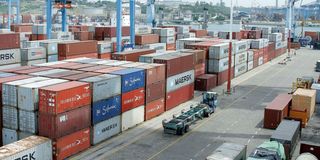Uproar over illegal fees by shippers in Mombasa

Cargo containers at the Port of Mombasa in September last year. The Kenya Ports Authority has doubled the free cargo storage window for domestic importers.
Additional costs for container services by shipping lines and some State agencies have left a bitter taste in the mouth of traders who are now warning that it risks eroding the competitiveness of the key gateway.
A document seen by Saturday Nation showed that some shipping lines have introduced a number of levies contrary to a directive by the Kenya Maritime Authority (KMA).
For example, major players are charging equipment management fees, ex-border charges, late documentation per bill of lading fee, container cleaning fees, and import documentation fees among others, which incidentally were revoked by Tanzania Shipping Agencies Corporation (TASAC) that runs the rival Dar es Salaam port.
Shipping lines have introduced an equipment management fee where importers are charged $50 (Sh7,371.21) for 20 feet container, $100 (Sh14,743.42) for a 40-foot container, and a $100 (Sh14,743.42) ex-border charge as well as a $50 (7,370.92) for late documentation per bill of lading.
Further, shipping lines have also introduced a $20 (Sh2,948.30) to clean a 20-foot container and $35 (Sh5,159.52) for a 40-foot one without approval of the sector regulator.
The Kenya International & Warehousing Association (Kifwa) has protested over these levies and urged KMA to revoke them because they blunt the competitiveness of the port.
“We are calling for suspension of all new charges introduced after the KMA directive of 2019 on upward tariff amendment. Any upward tariff adjustment must be justified and stakeholders must be consulted prior to approval by KMA,” said Kifwa national chairman Roy Mwanthi.
The lobby group also faulted some shipping lines for delays in generation of invoices for local charges and for insisting on generating some from outside Kenya, which is against maritime regulation.
Traders said several shipping lines operating at the Mombasa port do not recognise bankers’ cheques from Kenya and subject them to further scrutiny and confirmation of maturity, undermining the Central Bank.
To resolve the issue, a steering committee formed to tackle bottlenecks at the Mombasa port has recommended that KMA only allows shipping lines that generate the invoices and receipts locally to save time and time consumed during the delays should be compensated in the demurrage-free period.
Mr Mwathi, however, noted that several stumbling blocks at the port had been cleared including duplicative weighbridges.
"Already some of the issues such as reduction of the number of weighbridges have been reduced for transit goods, now we are streamlining the implementation of pre-arrival clearance and streamlining of the export process," he said.
He added; "This is part of the President's directive that transit cargo be weighed only twice and full elimination of roadblocks on the transit corridor.”.





